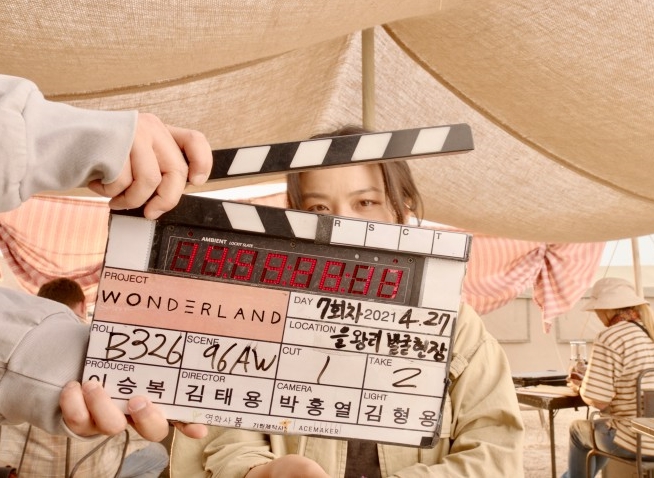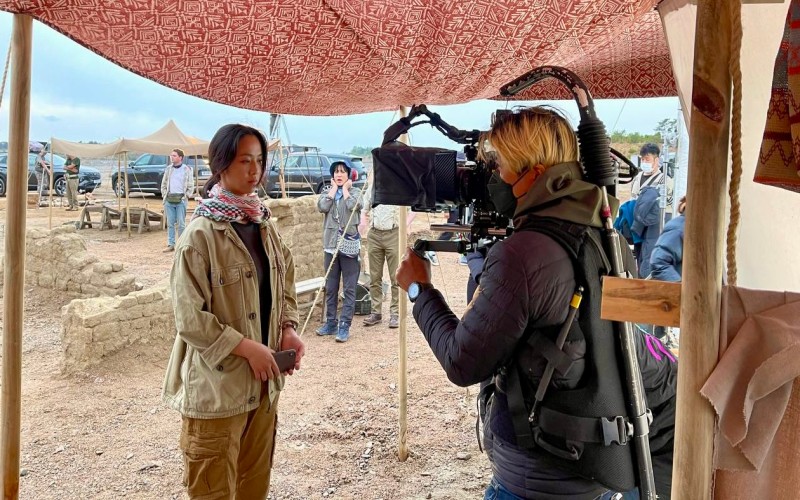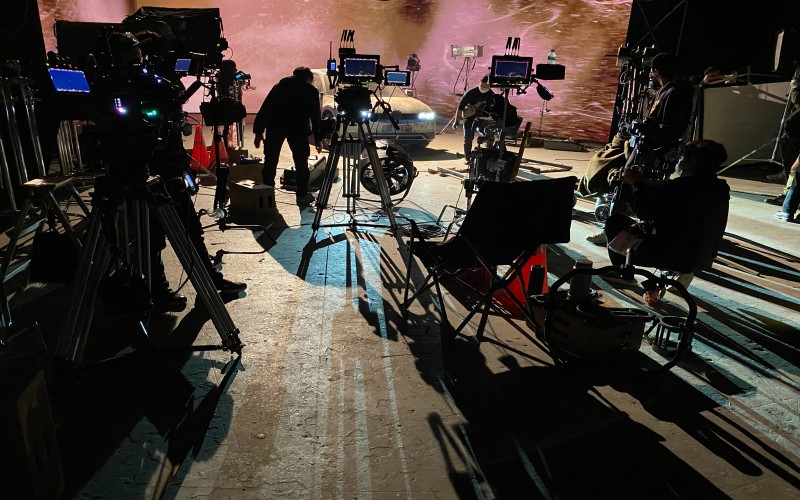- 한국어
- English
- 日本語
- 中文
- العربية
- Español
- Français
- Deutsch
- Pусский
- Tiếng Việt
- Indonesian
By Honorary Reporter Ghada Mohamed Ali from Egypt
Photos = Park Hong-yeol
"Wonderland," a film directed by Kim Tae-yong released this summer, is a journey to a virtual world where loved ones reunite in digital life. The cast features Korea-based Chinese actor Tang Wei (Chinese actress) alongside co-stars Bae Suzy and Park Bo-gum.
Tang's energetic portrayal of Bai Li in the film caught my attention, as well as the techniques used to add extra dimension to her character's virtual reality.
To explore this further, I interviewed Park Hong-yeol, the cinematographer behind one of the most visually captivating characters in Wonderland, on his art, the challenges of filming in multiple locations and his perspective on the explosive yet ethereal world of Tang's character.

Tang Wei prepares for a take in the film "Wonderland."
The following are excerpts from an email interview with Park conducted from July 28 to Sept. 6.
Briefly introduce yourself.
I'm a cinematographer who majored in physics in college and later studied cinematography at the Korean Film Academy and Korean National University of Arts. Historically, Korea's film cinematography system had an apprenticeship system in which advancement came through working in on-set positions before becoming a director of photography. I went through this system as well as formal training at film school to become a cinematographer.
I have worked on films directed by Hong Sang-soo like "Hahaha" and "On the Beach at Night Alone." This year, my documentary "Landscape Drifting" will be shown at the Busan International Film Festival.
What inspired you to pursue this career?
I believe that movies have the power to make the world more beautiful and happier. I began by making indie documentaries and later sought to improve in documentary cinematography by learning feature film cinematography. After studying cinematography on commercial film sets and at film school, I started work as a commercial cinematographer. Even now, I hope that my images contribute to changing the world.
What cinematographers have influenced your style or artistic vision?
Rather than a specific cinematographer, I'm influenced by all films. But I've been greatly influenced by the work and ideas of Dziga Vertov of Russia. Above all, what helps my cinematography the most is philosophy, which I study regularly to improve. A philosopher who inspires my work is Gilles Deleuze, and I've recently gained inspiration from books by the Hong Kong philosopher Yuk Hui.

The camera moves close to Tang Wei to create a sense of intimacy.
What visual inspirations did you use for the film's cinematographic style?
I mainly draw visual inspiration from philosophy books. I believe that novelty and creative energy don't come from strange or unusual things but from the ordinary surroundings of daily life. It invites us to re-examine daily life and discover what we haven't seen before.
In "Wonderland," I pondered how to present everyday imagery from a slightly different perspective, approach familiar cinematic images from a new angle and express familiar filmmaking habits in a different manner.
What scenes or shots in the film you are especially proud of and why?
The scene where Bai Li encounters a sandstorm as she tries to leave the archaeological site is special to me. We had a very limited budget for this scene, and it wasn't easy to create a realistic sandstorm with the available resources. To reduce the costs of CGI, we shot all the elements needed for the sandstorm effects ourselves.

Shown is the set of the sandstorm scene in "Wonderland."
How does Korean cinema distinguish itself in cinematography?
The crew in Korean cinema are incredibly passionate. Everyone works hard in their respective roles, giving their best to create a great film. I believe that the unique quality of Korean cinema is the dedication and pride of such personnel, who are often unseen.
msjeon22@korea.kr
*This article is written by a Korea.net Honorary Reporter. Our group of Honorary Reporters are from all around the world, and they share with Korea.net their love and passion for all things Korean.